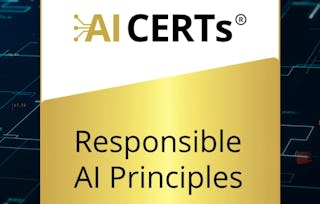The course "Responsible AI and Ethics" explores the ethical, social, and technical aspects of artificial intelligence (AI) and machine learning (ML). It focuses on understanding bias in both human and machine systems and provides strategies for mitigating risks. By examining key issues such as fairness, accountability, and the regulatory landscape, learners will gain essential knowledge to navigate the ethical challenges in AI. Through case studies and real-world examples, students will explore the complexities of AI implementations, assessing their impact on society and industries.

Trustworthy AI: Managing Bias, Ethics, and Accountability

Trustworthy AI: Managing Bias, Ethics, and Accountability

Instructor: Ian McCulloh
2,075 already enrolled
Included with
12 reviews
Recommended experience
What you'll learn
Understand the sources and trade-offs of bias in both human and AI systems, and learn strategies for mitigating these biases in AI implementations.
Explore ethical frameworks for responsible AI, focusing on transparency, fairness, and accountability, and gain knowledge of laws surrounding AI.
Analyze real-world AI case studies to identify strengths and weaknesses in AI adoption, and understand the considerations for managing AI projects.
Skills you'll gain
- Case Studies
- Business Ethics
- Law, Regulation, and Compliance
- Analysis
- Decision Making
- Workforce Management
- Accountability
- Data Ethics
- Risk Analysis
- Risk Mitigation
- Responsible AI
- Artificial Intelligence and Machine Learning (AI/ML)
- Machine Learning
- Artificial Intelligence
- Skills section collapsed. Showing 11 of 14 skills.
Details to know

Add to your LinkedIn profile
9 assignments
See how employees at top companies are mastering in-demand skills

There are 4 modules in this course
In this course, you will explore the ethical, social, and technical aspects of Artificial Intelligence (AI) and Machine Learning (ML), focusing on sources of bias, risk mitigation strategies, and the regulatory landscape. You'll examine the trade-offs between human and machine biases, AI team dynamics, and emerging labor trends. The key topics of this course include responsible AI use, legal frameworks, and the impact of evaluation methods on team performance. you will gain practical insights into building fairer, more effective AI systems through case studies and discussions.
What's included
1 reading1 plugin
This module introduces you to the concept of bias in Artificial Intelligence. While there has been much publicity and attention on the topic of machine bias, it often ignores human bias. In this module, you will compare human and machine bias to enable a more fair assessment of risk in AI systems. Specific attention will be paid to Machine Learning bias, algorithm bias, human bias, measurement bias, and algorithmic drift.
What's included
7 videos5 readings3 assignments1 plugin
This module introduces you to the complex topic of responsible AI. The common “risk-based approach” will be contrasted with the more ethical “human baseline approach.” You will also cover fiscal/performance responsibility, international regulations, privacy, and legal considerations.
What's included
8 videos3 readings3 assignments3 plugins
This AI case studies module offers you practical insights into AI's transformative power across various applications. You will explore successful integrations and lessons from AI's challenges, focusing on decision-making, implementation, and outcomes. Real-world examples will help you understand critical success factors and avoid potential pitfalls in AI adoption.
What's included
6 videos6 readings3 assignments
Instructor

Offered by
Explore more from Machine Learning
 Status: Free Trial
Status: Free Trial Status: Free Trial
Status: Free Trial Status: Preview
Status: PreviewAI CERTs
 Status: Preview
Status: PreviewNortheastern University
Why people choose Coursera for their career

Felipe M.

Jennifer J.

Larry W.

Chaitanya A.

Open new doors with Coursera Plus
Unlimited access to 10,000+ world-class courses, hands-on projects, and job-ready certificate programs - all included in your subscription
Advance your career with an online degree
Earn a degree from world-class universities - 100% online
Join over 3,400 global companies that choose Coursera for Business
Upskill your employees to excel in the digital economy
Frequently asked questions
To access the course materials, assignments and to earn a Certificate, you will need to purchase the Certificate experience when you enroll in a course. You can try a Free Trial instead, or apply for Financial Aid. The course may offer 'Full Course, No Certificate' instead. This option lets you see all course materials, submit required assessments, and get a final grade. This also means that you will not be able to purchase a Certificate experience.
When you purchase a Certificate you get access to all course materials, including graded assignments. Upon completing the course, your electronic Certificate will be added to your Accomplishments page - from there, you can print your Certificate or add it to your LinkedIn profile.
Yes. In select learning programs, you can apply for financial aid or a scholarship if you can’t afford the enrollment fee. If fin aid or scholarship is available for your learning program selection, you’ll find a link to apply on the description page.
More questions
Financial aid available,

